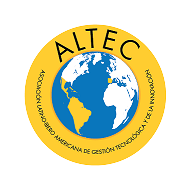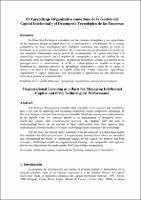| dc.contributor.author | Cabello-Galisteo, F. | |
| dc.contributor.author | García-Muiña, F.E. | |
| dc.date.accessioned | 2021-05-27T15:55:54Z | |
| dc.date.available | 2021-05-27T15:55:54Z | |
| dc.date.issued | 2013 | |
| dc.identifier.uri | https://hdl.handle.net/20.500.13048/843 | |
| dc.description.abstract | La Dirección Estratégica considera que los recursos intangibles y las capacidades de las empresas juegan un papel clave en la consecución y sostenimiento de la ventaja competitiva de base tecnológica. Así, múltiples conceptos han surgido en torno al fenómeno de la gestión del conocimiento. En el presente trabajo abordamos el estudio de dos conceptos relacionados con la gestión de los intangibles –el capital intelectual y el aprendizaje organizativo– con el objetivo de comprender, a partir del análisis de sus relaciones, cómo las empresas mejoran su potencial tecnológico gracias a la gestión de su principal activo: el conocimiento. A tal fin, el trabajo plantea un modelo en el que se identifican los diferentes procesos de aprendizaje organizativo a partir de los cuales se nutren y fortalecen los bloques de capital intelectual. Ambos conceptos –aprendizaje organizativo y capital intelectual– son inseparables y representan las dos dimensiones clave de la gestión del conocimiento. | |
| dc.description.abstract | The Strategic Management considers that intangible firm resources and capabilities
play a key role in achieving and sustaining technology-based competitive advantage. In
this way multiple concepts have emerged around the knowledge management phenomenon. In the present work two concepts related to the management of intangible assets -
intellectual capital and organizational learning- are studied, with the aim of
understanding, based on an analysis of their relationships, how they improve their
technological potential thanks to its main asset management companies: the knowledge.
For this goal, the present study concludes with the proposal of a theoretical model
that identifies the different processes of organizational learning from which are nourished
and strengthened the blocks of intellectual capital. In this regard, we propose that both
concepts - intellectual capital and organizational learning - are inseparable and represent
the two key dimensions that make up the firm’s knowledge management. | |
| dc.language.iso | spa | |
| dc.rights | info:eu-repo/semantics/openAccess | |
| dc.rights | Atribución-NoComercial-SinDerivadas 2.5 Perú | |
| dc.rights.uri | http://creativecommons.org/licenses/by-nc-nd/2.5/pe/ | |
| dc.subject | capital intelectual | |
| dc.subject | Aprendizaje organizacional | |
| dc.subject | Innovación tecnológica | |
| dc.title | El Aprendizaje Organizativo como Base de la Gestión del Capital Intelectual y el Desempeño Tecnológico de las Empresas | |
| dc.type | info:eu-repo/semantics/conferenceObject | |
| dc.relation.conferencedate | 27-31 de octubre, 2013 | |
| dc.relation.conferencename | XV Congreso Latino-Iberoamericano de Gestión Tecnológica | |
| dc.relation.conferenceplace | Porto, Portugal | |
| dc.contributor.corporatename | Universidad Rey Juan Carlos | |


